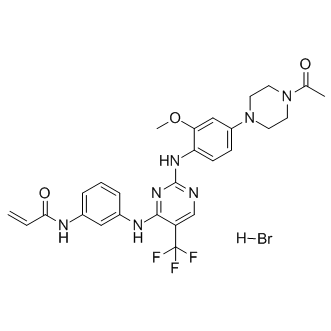| References: |
CO-1686 hydrobromide is a novel, irreversible and orally delivered kinase inhibitor that specifically targets the mutant forms of EGFR including T790M (IC50=21 nM).in vitro: CO-1686 is a potent inhibitor of EGFR L858R/T790M kinase (kinact/Ki = (2.41 ± 0.30) x 105 M-1s-1) and is approximately 22-fold selective over WT EGFR (kinactt/Ki = (1.12 ± 0.14) x 104 M-1s-1). CO-1686 potently inhibited proliferation in the mutant-EGFR NSCLC cellswith GI50 values ranging from 7 - 32 nM. In comparison, the GI50 value for A431 cells, an epidermoid cell line that is driven by amplified WT EGFR(19), was 547 nM. Two cell lines expressing WT EGFR in the presence of an N- or KRAS mutation (NCI-H1299 and NCI-H358,respectively) were inhibited by CO-1686 at a concentration of 4275 and 1806 nM, respectively.
in vivo: CO-1686 displays high oral bioavailability (65%) and a relatively long half-life of 2.6 hours when dosed at 20 mg/kg. Tumor-bearing mice were dosed orally once daily with CO-1686 as single agent and its effect on tumor growth was determined in several EGFR dependent xenograft models. Continuous oral dosing of CO-1686 causes dose-dependent and significant tumor growth inhibition in all EGFR-mutant models examined. At 100 mg/kg/day CO-1686 causs tumor regressions in two Erlotinib-resistant models expressing the L858R/T790M EGFR mutation, the NCI-H1975 cell line xenograft and the patient-derived lung tumor xenograft (PDX) LUM1868, while Erlotinib had no inhibitory effect on tumor growth. |























